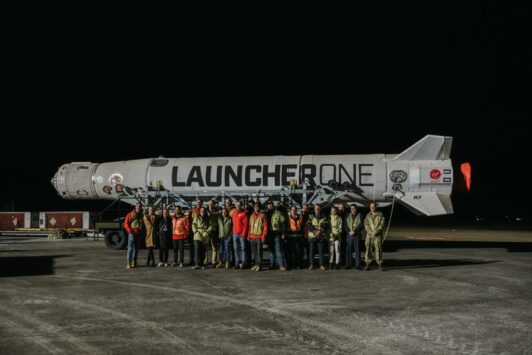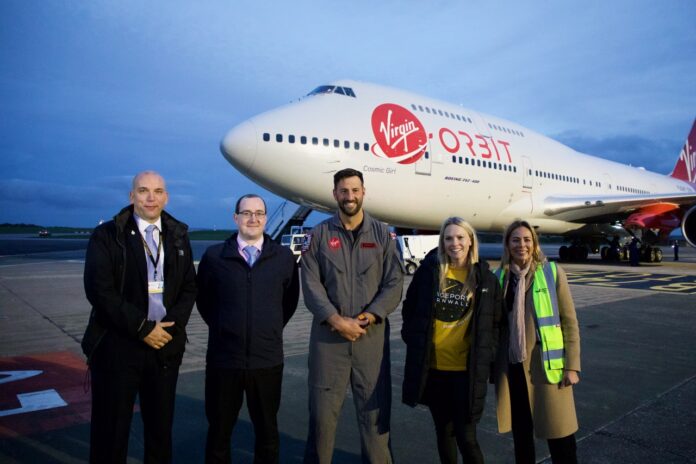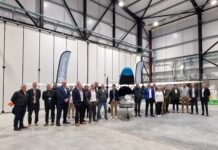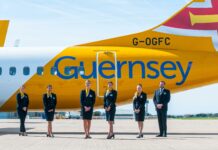Britain’s first ever orbital space launch is to set to blast off from Spaceport Cornwall tonight (Jan 9).
A repurposed Boeing 747 – Virgin Oribit’s Cosmic Girl – will take off from Cornwall Airport Newquay before releasing a rocket over the Atlantic, taking nine satellites into orbit.
It is the culmination of a project long in the making and is being seen an historic moment not just for Cornwall, but the UK as a whole.
A Spaceport transformation requires two things: the right facilities and legislation. Cornwall Airport Newquay (CAN) now meets every need. As a commercially regulated aerodrome, CAN already had many of the relevant facilities and infrastructure in place: a 2,744 x 45m long runway with surveillance systems and a secure perimeter to facilitate safe horizontal satellite launches, navigation aids, fuel storage and runway lighting. There were minimal infrastructure changes needed to make the site fully operational for space activity.
And with Spaceport’s sustainability values at the heart of their activities, CAN’s location made it the perfect contender for “the world’s responsible launch” site, offering uncongested airspace and low residential density. Its direct access to the Atlantic Ocean and segregated airspace, as well as the close proximity to world-leading satellite communications provider Goonhilly Earth Station (25 miles south) made this the ultimate launchpad for the UK’s newest space ventures.
Ian Jones, CEO of Goonhilly Earth Station, believes Cornwall is the perfect place to propel the UK Space scene towards global renown.
“We’re on a peninsula, surrounded by the ocean with the ability to get into, and communicate, with space,” he said. “It’s like living on our own little spaceship here. It’s also the sort of environment that makes our services exportable to the rest of the world. Like we exported mining over 200 years ago, we’re now exporting highly effective communications and that is the way forward.”
CAN’s transformation from a regional passenger airport to the UK’s first licensed space and air port was no easy feat. There were some key operational measures and procedures needed to get the project off the ground – the most challenging and integral being legislation and the CAA licensing.
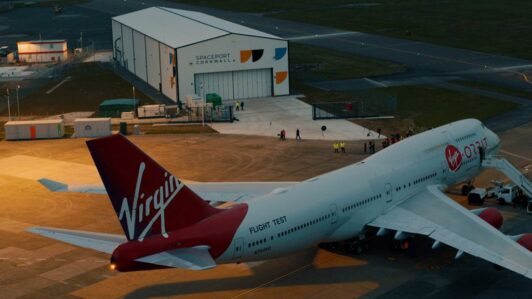
The team was involved in multiple aspects of the UK Civil Aviation Authority’s licensing process. Operationally, they prepared Echo Apron for the upcoming launch activities, provided the specialist ground servicing equipment, handled the inbound Cosmic Girl carrying the equipment for launch preparations, as well as handling and offloading the Launcher One rocket upon its arrival from the United States.
Thanks to its teams’ aerodrome support, marshalling, guidance, security and air traffic control provision, both the Echo Apron and the Space Systems Integration Facility are ready for launch. With safety underpinning all launch preparations, Cornwall Airport Newquay received the UK CAA’s approval back in November, becoming the UK’s very first airport to hold a Spaceport licence.
Speaking about the transformation, airport MD Sam O’Dwyer said: “We are incredibly proud to be involved in this innovative project to enable space launch from Cornwall Airport Newquay with Spaceport Cornwall and Virgin Orbit. The team effort that has gone into developing a fully licensed Spaceport facility which will deliver safe and secure space operations for the UK’s first ever space launch has been simply inspiring and I’d like to say a massive well done to my team.”
CAN says the aerodrome will continue to provide commercial airport services, after its teams worked hard across the business to develop safe Spaceport facilities alongside a busy summer schedule.
Underlining the importance of deep collaboration, communication and trust when it comes to delivering such an ambitious project, CAN worked with a number of key stakeholders within the Spaceport Cornwall consortium, while keeping much of its activity in-house – a distinctive feature of the organisation’s operational processes across the board.
A training plan was developed for all Air Traffic Controllers (ATC) to ensure new terminologies (for types of fuel, new roles, responsibilities and regulations) were clearly understood. The Rescue & Fire Fighting Service (RFFS) also supported Spaceport activities throughout, managing staffing levels and fire appliances in preparation for the arrival of Virgin Orbit’s Cosmic Girl and Californian colleagues.
Various in-house teams also revised the Spaceport Cornwall Safety Case for CAA licensing requirements and developed the Launch Day Airspace Plan – alongside updating the Hazardous Operations Procedures & Checklists, Spaceport Manual, Aerodrome Manual and Emergency Response.
Melissa Thorpe, head of Spaceport Cornwall, added: “Working with our partners at Cornwall Airport Newquay is key to the success of this mission. The collaborative spirit between our teams and the sharing of expertise will result in history being made, and we couldn’t be more proud.”
Looking ahead, it is hoped that working in tandem with Spaceport Cornwall and Virgin Orbit, the Cornwall and the Isles of Scilly (CIoS) Space Enterprise Zone will lead the way in commercial small satellite launch activities and sub-orbital spaceflight operations.
According to the Cornwall and Isles of Scilly LEP, the region could contribute an additional £1 billion of economic value to the region through increased productivity, jobs, and turnover by 2030.
